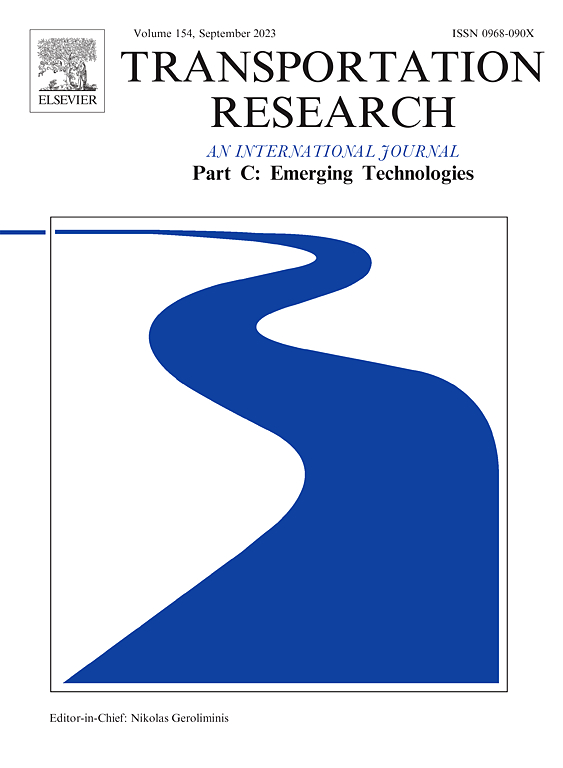异构用户多模式取送问题的定价问题
IF 7.6
1区 工程技术
Q1 TRANSPORTATION SCIENCE & TECHNOLOGY
Transportation Research Part C-Emerging Technologies
Pub Date : 2024-11-02
DOI:10.1016/j.trc.2024.104864
引用次数: 0
摘要
在本文中,我们研究了具有多种运输模式的取货和送货问题,并解决了在对用户与他们所需的送货模式进行价格匹配的同时有效分配运输资源的难题。更确切地说,我们认为订单是由异构用户群体提出的,他们对价格和延迟的权衡各不相同。为了捕捉价格如何影响在多种交付模式之间做出选择的异构自私用户的行为,我们构建了一个在星形网络上发生的拥塞博弈,其中每个源-汇对都由连接用户与其首选交付方式的并行链路组成。利用该网络的独特几何形状,我们证明了可以通过明确设置价格来诱导任何所需的网络流量,也就是说,给定一个所需的分配策略,我们就能得到一个交付价格的闭式解。最后,我们利用现实世界的实例数据,对具有多种快递方式的送餐问题进行了案例研究。本文章由计算机程序翻译,如有差异,请以英文原文为准。
Pricing for multi-modal pickup and delivery problems with heterogeneous users
In this paper, we study the pickup and delivery problem with multiple transportation modalities, and address the challenge of efficiently allocating transportation resources while price matching users with their desired delivery modes. More precisely, we consider that orders are demanded by a heterogeneous population of users with varying trade-offs between price and latency. To capture how prices affect the behavior of heterogeneous selfish users choosing between multiple delivery modes, we construct a congestion game taking place over a form of star network, where each source–sink pair is composed of parallel links connecting users with their preferred delivery method. Using the unique geometry of this network, we prove that one can set prices explicitly to induce any desired network flow, i.e, given a desired allocation strategy, we have a closed-form solution for the delivery prices. We conclude by performing a case study on a meal delivery problem with multiple courier modalities using data from real world instances.
求助全文
通过发布文献求助,成功后即可免费获取论文全文。
去求助
来源期刊
CiteScore
15.80
自引率
12.00%
发文量
332
审稿时长
64 days
期刊介绍:
Transportation Research: Part C (TR_C) is dedicated to showcasing high-quality, scholarly research that delves into the development, applications, and implications of transportation systems and emerging technologies. Our focus lies not solely on individual technologies, but rather on their broader implications for the planning, design, operation, control, maintenance, and rehabilitation of transportation systems, services, and components. In essence, the intellectual core of the journal revolves around the transportation aspect rather than the technology itself. We actively encourage the integration of quantitative methods from diverse fields such as operations research, control systems, complex networks, computer science, and artificial intelligence. Join us in exploring the intersection of transportation systems and emerging technologies to drive innovation and progress in the field.

 求助内容:
求助内容: 应助结果提醒方式:
应助结果提醒方式:


